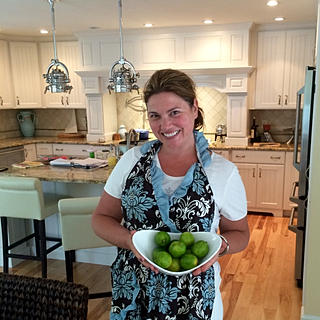Lucie Dillion. From Lady-in-Waiting to Cider Maker
- Tricia Cohen
- Sep 30, 2017
- 4 min read
Updated: Dec 30, 2022
While researching Johnny Appleseed and all of his cider trees, I came across the story of Henriette –Lucy “Lucie” Dillon, Marquise de la Tour du Pin Gouvernet. Quite the name for quite the woman.

Born into an aristocratic family in France on February 25, 1770, Lucie was a lady-in-waiting to Marie-Antoinette when she was 16. Unfortunately, Lucie was in the court of Louis XVI at the most turbulent time in France. Out of fear, Lucie (24), her husband Frederic, and their two young children left France for America in 1794. Lucie lobbed off her beautiful long hair, tossed out her fancy clothes, and rid herself of her cherished possessions as she boarded the cargo ship, Diane, for America. When she arrived in Boston, the other French immigrants assumed that the humble-looking family had suffered as they had in their beloved former country. They even thought that the government unwillingly chopped her hair off. Nevertheless, Lucie successfully sheds her former life to begin a new one in a new country. The family would spend the next 15 days traversing the picturesque landscape of Massachusetts, eventually settling in Albany, New York, as it was close to Canada, where their language and culture were understood. In the Hudson River Valley, the family purchased a dairy farm where they tended the cows, made cider and grew crops. According to her memoir, this dramatic lifestyle change made Lucie the happiest she had ever been.
The idyllic 250-acre farm is where the family created an excellent reputation for making cider. Cider was one of the most common beverages in the colonies at this time. US President John Adams famously drank a tankard (similar to a beer stein) each morning. Farmhouses and orchards would produce cider for an income and maintain a supply for themselves; each family member would drink this, including children. It was also customary to leave a barrel at the front door for passing visitors. Lucie and Frederic used the techniques they knew from their homeland to tend to the orchard, resulting in one of the finest in the area. Using a traditional wine growers technique from Bordeaux, they turned over a four or 5-foot section of the earth around the base of the apple trees with a spade. The other orchard owners had never seen a farmer do such a thing and thought the young couple was mad. However, when the spring came, and each tree glistened in blossoms, the other farmers looked at the family as “sorcerers.” Although the flowers produced an abundance of apples, “we could count upon the trees as many apples as there were leaves.” Another sound decision they made was how they stored their cider. Not in new casks made of porous wood, like the others, they found old barrels in Albany that had once contained Bordeaux and Cognac. They cared for the cider as if it had held the wine of the Medoc. The family could reserve much of the cider for their use, but due to the abundance of apples, they could sell 8-10 barrels of the beverage. The decision to make and store cider brought them a good reputation in the area as honest cider makers. Labeled ‘honest’ was a significant advantage, as there were no concerns from the buyers that water would be mixed into the barrels. As such, they could offer the barrels at the double the asking price, and consumers were willing to pay it. Referring to the families’ reserves, Lucie stated, “we treated it exactly as we would have done with our white wine at Le Bouilh.” This meant that the cider was fit for a King. For you see, Chateau du Bouilh was the home built for Louis XVI in Aquitane, France, a place that Lucie knew well from her days as a lady in waiting for Marie Antoinette.

Sadly, in 1795, Lucie’s only daughter Seraphine suffered and died from a brief illness, infantile paralysis, and was buried in an unmarked grave near the family home. Shortly after the death, Lucie, her husband, and her son returned to France. Frederic returned to a position of wealth and importance, and Lucie found her place again in the elite social world. At the request of Napoleon, she returned to the position of a lady in waiting, this time for the Emperor's wife, Josephine. The family stayed in France for some time and later moved to Switzerland after their son was accused of a political plot. Eventually, Lucie made her way to Italy, where she passed away peacefully in Pisa on April 2, 1853.

The beautiful farm the family-loving tendered in Albany is sadly gone. However, the house is still standing. Lucie’s memoir, written as a letter to her son over thirty years, was published in Paris in 1906. Her first-hand account of life and times in France and America, ‘Recollections of the Revolution and the Empire,’ is available online.
Apple cider is one of my favorite ingredients to use when cooking. The ingredient adds brightness to recipes. My delicious Apple Cider Vinegar and Honey Chicken recipe highlight that brightness is simple.







